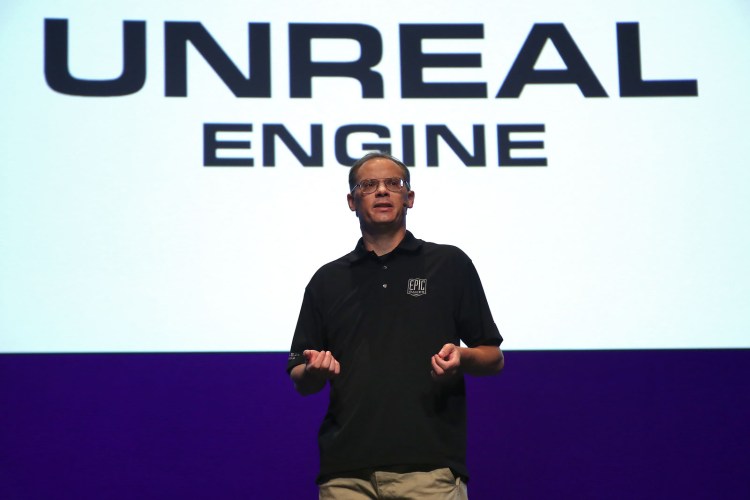Bullet Train was one of the stars at last week’s Oculus Connect conference in Hollywood. Being able to use your hands in virtual reality in a first-person shooter felt incredibly natural. According to developer Epic Games, this was exactly the experience it was aiming for.
Known for creating highly influential games like Gears of War and Unreal Tournament, Epic has been working with the Facebook-owned Oculus VR for a few years now. At last year’s Connect, it unveiled its Showdown demo for Crescent Bay, a prototype of the Oculus Rift VR headset. Like Bullet Train, Showdown also had a cool slow-motion effect with a lot of guns and a giant robot.
These technical demos are meant to show developers the kind of impact VR could have on games — as well as what they could achieve if they use Epic’s free Unreal Engine 4 game creation tool. The company also recently released the first video in a new documentary series about VR on YouTube.
Epic Games is clearly investing a lot of resources to making sure VR catches on with a mainstream audience. So talked with founder and chief executive Tim Sweeney (who’s also headlining our GamesBeat 2015 conference) during the conference and asked him about Bullet Train and his views on VR’s future. Here’s an excerpt from our interview.
[youtube https://youtu.be/DmaxmnPzMWE]GamesBeat: How long ago did Epic receive prototypes for the Oculus Touch motion controllers?
Tim Sweeney: Oh wow, I don’t think we can say that.
We’ve been working with them for a while, really trying to figure out how to take full advantage of them. Direct-map controls — it’s the missing ingredient that makes VR just work magically well. Once you have the motion controllers, your hands are there in the world, and your brain just knows what to do magically. It’s not like a game controller where you have to learn some alternate control scheme. It has that magical property that an iPad has. You already know how to run it.
GamesBeat: Why did Epic decide to make a shooter as its first Oculus Touch demo?
Sweeney: The VR team played around with a number of ideas, but they really wanted something that felt completely natural and would work extremely well with the motion controllers. This is our fifth demo for Oculus hardware and the first one that takes advantage of the motion controllers. Using them to enrich the experience as much as possible was the goal.
And they also really wanted to solve the locomotion problem, and the teleportation approach they implemented really [works] well. It gets you from place to place quickly without ever having the possibility of being in the wrong place for the gameplay. It feels really good.
GamesBeat: You can only teleport to specific points in the level, right?
Sweeney: Yeah, that’s right. The designers placed them and they orient [you]. If it was just freeform locomotion, you’d have to walk from place to place, but also you’d have to turn around — and sometimes 360 degrees — so you’re facing the right direction. It solves a number of problems all in one [mechanic].
GamesBeat: Are there different teams at Epic in charge of making VR demos?
Sweeney: There’s a dedicated VR team. They’re helped by other people throughout the company when they need it. The Bullet Train demo had a maximum of 12 people. They worked for about 10 weeks to put that demo together. It shows what you can do in a really small amount of time with the engine. The smallness of it is I think one of the most impressive things.
GamesBeat: That seems to be a common thing among the developers I spoke with here at the conference. It only took them a couple of months to have VR demos up and running.
Sweeney: Yeah, and that’s kind of the characteristic of the early VR days. It’s a small enough market that you can’t have a $100 million budget and put a 100-person team together to build a game like Gears of War. So you’re gonna see a lot of really creative efforts from small teams. The games will be smaller — I think that’s the ideal situation for the industry because you’re gonna see a lot of really rapid progress and iteration. Lots of ideas will be tested.
It’s not gonna take years to figure out what are the best approaches to controls and locomotion. It’s gonna take a matter of months as games build on each other’s learnings.
GamesBeat: Shorter game lengths also seem ideal because we don’t know exactly how long people are willing to wear these headsets in one sitting.
Sweeney: As the hardware improves, those numbers will increase dramatically. We’re not more than a few years away from the point of having VR hardware that is so polished and natural that you can just wear it all day long at your job. I can imagine an automotive designer or an industrial designer building a product in 3D all in real-time. That’s the way a lot of people are going to work in the future.


